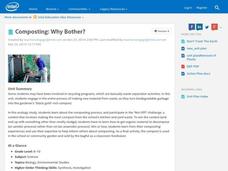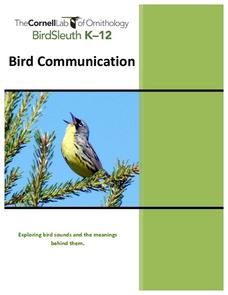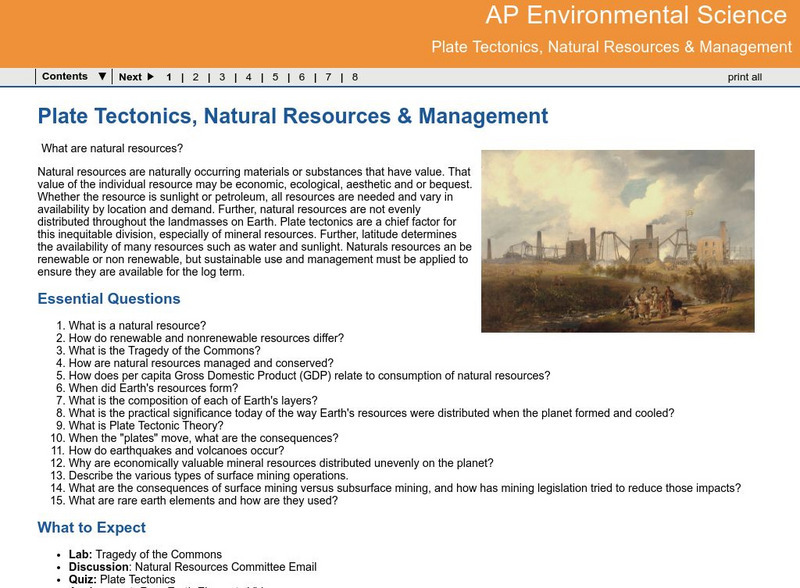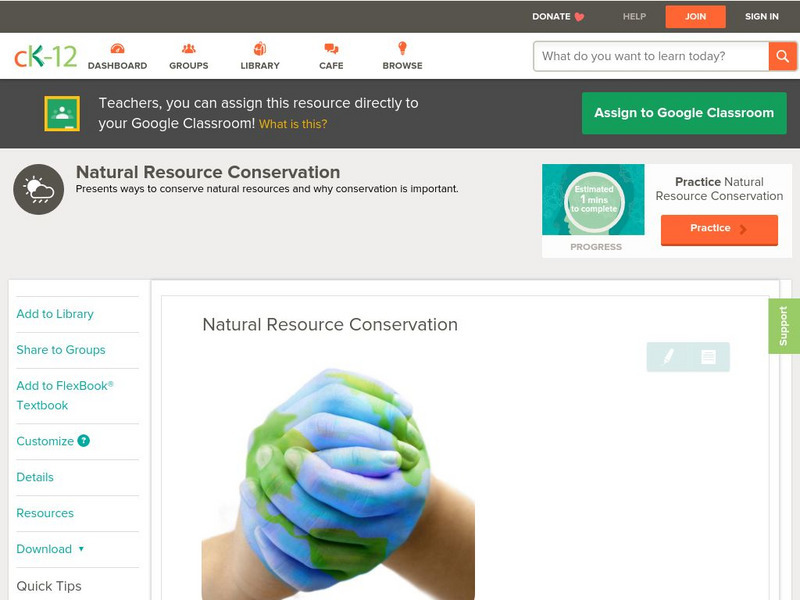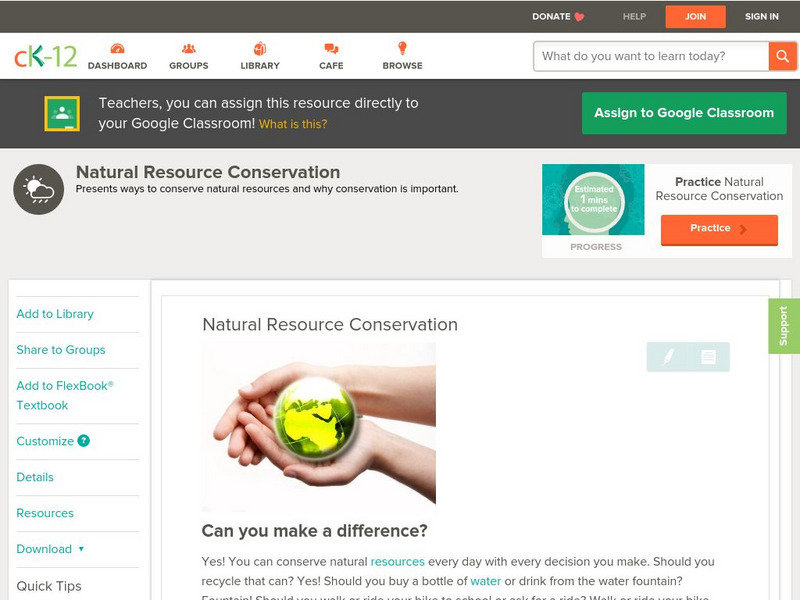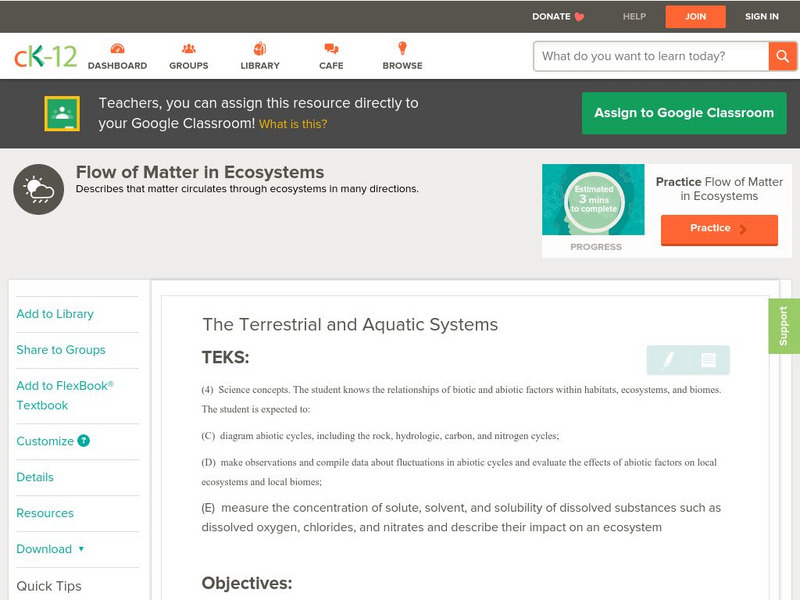Cal Recycle
Conserving Natural Resources
Trying to plan an engaging elementary science unit on natural resources? Conserve your energy! This five-part series of lessons and hands-on activities has exactly what you need to teach young scholars about the importance of conservation.
Curated OER
Taking Charge of our Earth and its Resources
Students identify natural resources, discuss conservation and protection of them, and identify how pollution is harmful to the environment. Seven lessons on one page.
Columbus City Schools
ABC: Acid Base Chemistry
Bubble, bubble, boil and trouble! What causes common substances like baking soda and vinegar to react the way they do? Welcome your junior chemists to the wonders of acid-base chemistry using a comprehensive and fun...
Cornell Lab of Ornithology
Investigating Evidence
Explore the scientific process through nature. Scholars become scientists as they develop a question, design an experiment, collect data, and analyze their results. A two-week lesson guides your classes through the process and provides...
Intel
Composting: Why Bother?
The first STEM lesson in a group of 10 explores composting. After discussing how to make a better tomorrow, classes are challenged to track garbage in their communities, visit a local waste management facility, and conduct a survey...
Cornell Lab of Ornithology
Life In A Nest: Exploring Life Cycles With Bird Cams
Why read about it when you can watch it happen? Bird cams make it possible for learners to experience the life cycle of a bird in real time! An engaging set of lessons provides activities to connect their learning to bird cam...
Cornell Lab of Ornithology
Bird Communication
Sing for your dinner! Investigate the purpose of bird songs and strategies birds use to communicate. Through the lessons, individuals learn how to recognize different types of bird communication as well as hypothesize the purpose of...
CK-12 Foundation
Ck 12: Fifth Grade Science: Earth Science: Use and Conservation of Resources
Looks at how people use natural resources and ways to conserve natural resources in this module. Module reviews over conservation, natural resources, and precycling with explanations, graphs, and pictures.
Georgia Department of Education
Ga Virtual Learning: Ap Environmental Science: Plate Tectonics,natural Resources
Through interactive activities and readings, students learn that natural resources can be renewable or nonrenewable, but sustainable use and management must be applied to ensure they are available for the long term.
CK-12 Foundation
Ck 12: Earth Science: Natural Resource Conservation
[Free Registration/Login may be required to access all resource tools.] Ways that natural resources can be conserved.
CK-12 Foundation
Ck 12: Earth Science: Natural Resource Conservation
[Free Registration/Login may be required to access all resource tools.] Describes the ways that natural resources can be conserved.
Georgia Department of Education
Ga Virtual Learning: Ap Environmental Science: Terrestrial Biomes and Land Use
How we can live sustainably on our natural resources while also preserving enough nature so these resources can be replenished represents one of the most important questions in environmental science. Through learning about terrestrial...
Annenberg Foundation
Annenberg Learner: The Habitable Planet: Water Resources
Learn about water as a precious resource in danger of being depleted. Understand the roles that overuse and agricultural use play in the sustainability efforts of this essential resource. Includes video. [28:25]
Georgia State University
Georgia State University: Eco Connections: Conservation of Resources
During our exploration of each previous lesson, we have learned about many of the factors that contribute to the ongoing destruction of our environment. In our final lesson, we will make a holistic appraisal of the impact that each of...
E-learning for Kids
E Learning for Kids: Science: Ocean Center: Why Do We Need to Conserve Water?
Go aboard on a cruise ship with Denise and her family. Help her learn about water conservation, and why it is important.
Center for Educational Technologies
Nasa Classroom of the Future: Temperate Rainforest: Ecology and Land Use
Use these resources to study the ecology of the rainforest of the Pacific Northwest and issues surrounding its preservation.
Georgia Department of Education
Ga Virtual Learning: Environmental Worldviews, Ethics, and Sustainability
Through this interactive module, history has shown that the multifaceted aspects of nature have been overlooked many times in the past. And thus, our pursuit to control our environment has failed and left us wanting. What does the future...
Georgia Department of Education
Ga Virtual Learning: Ap Environmental Science: Aquatic Biomes and Ecology
Students explore Earth's most important natural resource, water, and learn about how the planet's aquatic biomes thrive and support life.
PBS
Pbs Learning Media: Sharks in Our Future
In this video segment from Nature, see the value that sharks can have on the tourism industry in an area. [1:41]
Other
Manitoba Model Forest Network: Interaction Within Forest Ecosystems [Pdf]
This comprehensive Grade 7 Science unit has three chapters on forest ecosystems, natural cycles in a forest, and human interactions with a forest. Each chapter has experiments, activities and questions complete with answers. There are...
CK-12 Foundation
Ck 12: Earth Science: Flow of Matter in Ecosystems
[Free Registration/Login may be required to access all resource tools.] In this module, students will learn about the cycles of nature (water, carbon, nitrogen, and phosphorus) that support the flow of nutrient matter through an...
Scholastic
Scholastic: Study Jams! Science: Energy, Light and Sound: Fossil Fuels
A slideshow and a short quiz on the types of fossil fuels we use and the impact this has on the environment.




